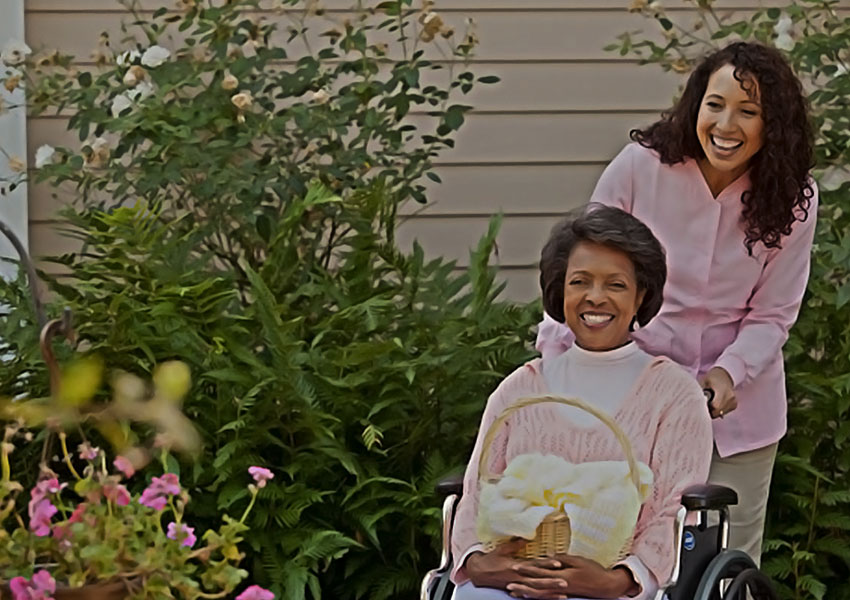What’s the difference between Alzheimer’s and dementia? The two terms are often used interchangeably, but there is a difference. Think of dementia as an umbrella that covers all types of cognitive decline, and Alzheimer’s disease as one of the many types of disorders that is under the umbrella.
Alzheimer’s is the most common form of dementia, and the Alzheimer’s Foundation states that up to 64% of all dementias are due to Alzheimer’s. But Alzheimer’s is often diagnosed after other types of dementia have been ruled out, as the disease can only be definitively diagnosed with a post-mortem autopsy on the brain. The Diagnostic and Statistical Manual of Mental Disorders (DSM ) defines dementia as “an overall decline in intellectual function, including difficulties with language, simple calculations, planning and judgment, and motor skills, as well as loss of memory.” Dementia can be caused by nearly forty different diseases and conditions. The Encyclopedia of Mind Disorders lists various types of dementia:
-
Primary dementias are characterized by damage to or wasting away of the brain tissue itself. They include Alzheimer’s disease (AD), frontal lobe dementia (FLD), and Pick’s disease. FLD is dementia caused by a disorder (usually genetic) that affects the front portion of the brain, and Pick’s disease is a rare type of primary dementia that is characterized by a progressive loss of social skills, language, and memory, leading to personality changes and sometimes loss of moral judgment.
-
Multi-infarct dementia (MID) or vascular dementia is caused by blood clots in the small blood vessels of the brain. When the clots cut off the blood supply to the brain tissue, the brain cells are damaged and may die.Lewy body dementia. Lewy bodies are areas of injury found on damaged nerve cells in certain parts of the brain. They are associated with Alzheimer’s and Parkinson’s disease, but researchers do not yet know whether dementia with Lewy bodies is a distinct type of dementia or a variation of Alzheimer’s or Parkinson’s disease.
-
Dementia related to alcoholism or exposure to heavy metals.
-
Dementia related to infectious diseases. These infections may be caused by HIV, viral encephalitis, Lyme disease, syphilis, Creutzfeldt-Jakob disease, etc.
Dementia related to abnormalities in the structure of the brain. These may include a buildup of spinal fluid in the brain, tumors, or blood collecting beneath the membrane that covers the brain.
Another condition, called “delirium,” is a temporary state of confusion. It is common for an older adult in an unfamiliar situation to exhibit what appears to be dementia but gradually clears after a short period of time. Delirium may also be associated with depression, low levels of thyroid hormone, or niacin or vitamin B12 deficiency, and is often remedied with medical treatment.
The rise in using the term Alzheimer’s to include any type of dementia has grown over the years, largely due to the association that those with dementia are “demented,” a word with historically negative connotations.
Education on issues like Alzheimer’s is just one small way in which senior care coordinators at companies like Always Best Care Senior Services help many communities throughout the country.
For more information on dementia and Alzheimer’s disease, contact a Care Coordinator at any of the individually owned and operated Always Best Care Senior Services offices located throughout the country. To find the Always Best Care office nearest you, please visit www.alwaysbestcare.com.
Tonja Edelman, MSW, is a Franchise Operations Trainer at Always Best Care Senior Services, and a former Deputy Public Conservator. Through its network of independently owned and operated franchises, Always Best Care Senior Services provides non-medical in-home care, assisted living placement and skilled home health care for seniors across the country. Visit Always Best Care Senior Services at www.alwaysbestcare.com.
Always Best Care Senior Services
Always Best Care Senior Services (www.alwaysbestcare.com/) is based on the belief that having the right people for the right level of care means peace of mind for the client and family. Always Best Care Senior Services has assisted over 25,000 seniors, representing a wide range of illnesses and personal needs. This has established the company as one of the premier providers of in-home care, assisted living placement assistance, and skilled home health care.
To print this article CLICK HERE




























































































































